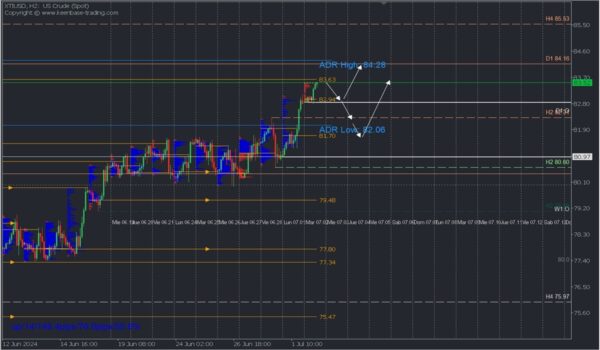Bearish Scenario:
Sell below 83.63 (if a PAR* forms) with TP1: 83.00, 82.31, 82.11, and 81.70 in extension with an S.L. above 84.00 or at least 1% of account capital.
Bullish Scenario after a Pullback to Demand Zone:
Wait for a decline towards 82.00 and the formation of a bullish PAR* with TP1: 84.16 and TP2: 85.53, with an S.L. below 81.60 or at least 1% of account capital. Apply Trailing Stop.
Fundamental Analysis
Expectations of Increased Oil Demand in the U.S.
- WTI crude oil prices continue to extend gains, trading around $83.10 per barrel, driven by expectations of higher fuel demand during the summer travel season.
- The American Automobile Association (AAA) projects a 5.2% increase in travel, with a 4.8% rise in car travel compared to last year. This suggests higher fuel consumption, pushing oil prices higher.
Technical Analysis.
WTIUSD, H4
- Supply Zones (Sell): 83.63
- Demand Zones (Buy): 82.94 / 81.70
Crude oil prices have already reached a supply zone at 83.63, from where a pullback towards the day’s opening near the early sessions’ POC at 82.94 is expected. Bulls may reactivate from this level for an additional rally during the U.S. session towards 84.16 or the average daily bullish range at 84.26 intraday, paving the way for further buys in the coming days.
Conversely, with stronger selling that breaks the daily demand zone around 82.94, a more extensive correction towards the broken resistance now acting as support at 82.31, the bearish range at 82.10, and possibly more extended to yesterday’s POC at 81.70 is expected, from where bulls may reactivate as a demand zone.
The bullish scenario after the correction remains valid as long as the last relevant support of the uptrend at 80.60 is not decisively broken.
*POC uncovered: POC = Point of Control: The level or zone where the highest concentration of volume occurred. If there was a bearish movement from it previously, it is considered a selling zone and forms a resistance area. Conversely, if there was a previous bullish impulse, it is considered a buying zone, usually situated at lows forming support zones.

